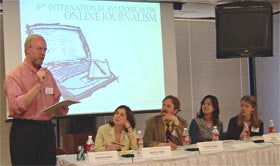UT Grad Students Survey Online Journalism

Taking charge of the second half of the panel on Issues in Online Journalism at the 2005 International Symposium on Online Journalism, graduate students Sonia Huang and Tania Cantrell gave in-depth analysis of who is using online news sources and how their experiences affect what they read.
Following Thomas Terry’s presentation on independent journalism and freedom of speech in a scholastic environment, Huang, a UT graduate student, shared her paper, “Diffusion Theory in an Internet Environment.” Based on Diffusion of Innovations by Everett M. Rogers, Huang’s research sought to discover who is using the Internet as an online news source and how long it took them to develop that habit.
“For old people, it’s really hard to be familiar with the technology, but what about young adults? What about college students?” Huang said.
Using a web-based survey, Huang discovered that young, Caucasian males are more likely to use online news sources than any other type of person surveyed and develop the habit of doing so much sooner on average.
Rogers’ research suggested that early adopters of new technology (online news sources in this case) would cause a decrease in the observable use of other mediums, Huang said. Contrary to this research, she found that early adopters of online news sources actually watch cable and local news more.
Using the same web survey, Tania Cantrell presented her paper “Who You Are and Where You’ve Been: Factors Influencing Student Online International News Reading,” citing that younger people are more likely to get their news from online sources, Cantrell reported her surprise in discovering that young people getting their news from online sources value international news second only to national news.
Her research sought to discover if a relationship between travel experience and the importance of international news exists.
“The more students have traveled abroad, the more likely they are to read international news,” she said.
Though their research indicates that online journalism is read mainly by a younger audience, they are both quick to reassure their audience that at least in the case of international news, online readership is on the up-swing.
ISOJ 2005: Issues in Online Journalism, from Knight Center on Vimeo.

